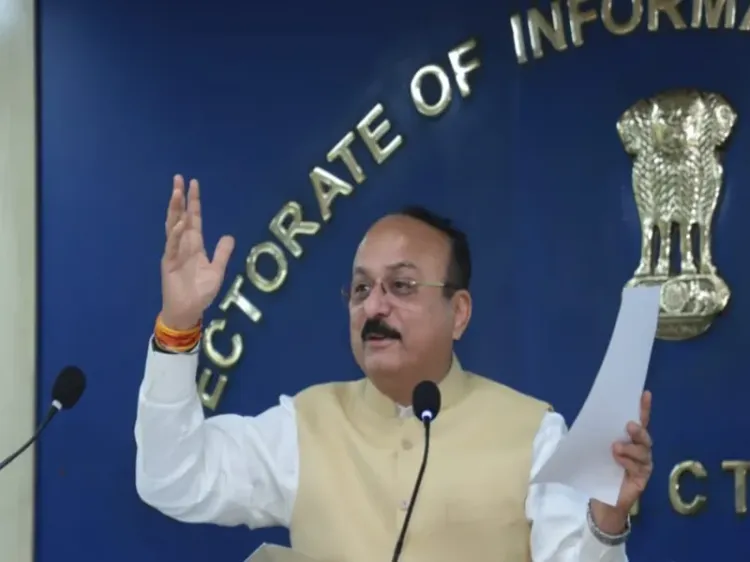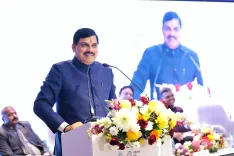Did Kejriwal Misuse Government Funds to Buy Mobile Phones Worth Up to ₹1.63 Lakh?

Synopsis
Key Takeaways
- Former Delhi Chief Minister Arvind Kejriwal allegedly misused public funds for mobile phones.
- The official spending limit was exceeded multiple times by government officials.
- High-end phones were purchased during critical periods, including the pandemic.
- Requests were made to relax spending limits after purchases were completed.
- Accountability of public officials is crucial for maintaining public trust.
New Delhi, July 17 (NationPress) Criticizing the hypocrisy surrounding spending cuts, Delhi's Education Minister Ashish Sood recently targeted the former Aam Aadmi Party (AAP) administration and its ex-Chief Minister Arvind Kejriwal for their extravagant use of public funds to purchase luxury mobile phones priced up to ₹1.63 lakh.
During a press briefing, Sood highlighted that the AAP government had exceeded the official spending limit for mobile devices assigned to the Chief Minister and other officials.
In 2013, regulations stipulated that the Chief Minister could acquire a mobile phone worth ₹50,000, while other ministers were allowed a maximum of ₹45,000.
“Nonetheless, AAP leaders acquired phones that surpassed these limits for personal use and pressured government employees to cover the costs. Now they are blaming the BJP government for allegedly authorizing the purchase of costly phones for Ministers,” he remarked.
Sood elaborated on the extravagant purchases made by four prominent figures from the prior administration: Arvind Kejriwal, Manish Sisodia, Atishi, and Saurabh Bharadwaj. He explained how, despite an official cap, these leaders opted for high-end devices and pressured officials to utilize taxpayer money to settle the bills.
The Delhi Minister noted that a mobile phone is essential for public representatives, serving as a mobile office. “However, rules and regulations must be adhered to,” he asserted.
He detailed that Kejriwal had acquired four mobile devices from the Delhi government between 2015 and 2022. His first acquisition, an iPhone 6s Plus, was bought on December 1, 2015, for ₹81,000—well above the ₹50,000 limit.
The second device, an iPhone 7 Plus, was procured on September 12, 2017, for ₹69,000. The third, an iPhone 12 Pro Max, was purchased during the COVID-19 pandemic on December 4, 2020, for ₹1,39,900.
The final acquisition, an iPhone 13 Pro Max, was taken on July 13, 2022, costing ₹1,63,900.
“Despite the official limit being ₹50,000, these devices vastly exceeded the threshold,” stated Sood.
He further indicated that a government official had noted that the spending on the iPhone was excessive.
Moreover, he pointed out that the Chief Minister's office had issued correspondence regarding these phones, indicating, “The amount spent is significantly above the prescribed limit for purchasing a phone for the Chief Minister. It is believed that a relaxation beyond the set limit was requested for these purchases.”
Essentially, requests were made to override the ₹50,000 purchase limit to authorize these high-end devices, he explained.
Sood also noted that former minister Manish Sisodia bought a Samsung Galaxy S8 with accessories on July 11, 2017, for ₹59,899. In 2018, he purchased another Samsung S8 for ₹49,000.
In 2019, he made another acquisition, including accessories, for ₹1.12 lakh. In 2021, he bought an iPhone 12 Pro Max for ₹1.66 lakh, and on October 11, 2022, he purchased an iPhone 13 Pro Max for ₹1.37 lakh.
Sood emphasized a concerning trend: a phone was bought in 2017, again in 2018, and again in 2019. “They missed 2020, but resumed purchases in 2021 and 2022,” he noted, highlighting that these expenses escalated, even during the critical pandemic period.
During the pandemic, Kejriwal procured phones costing ₹1.40 lakh and ₹1.64 lakh, while Sisodia bought devices priced at ₹1,66,700 and ₹1.37 lakh. As ministers, their authorized spending limit was merely ₹45,000 each, Sood remarked.
The Education Minister pointed out that they even sought ex-post facto approval—requesting retroactive permission after purchases were already made.






